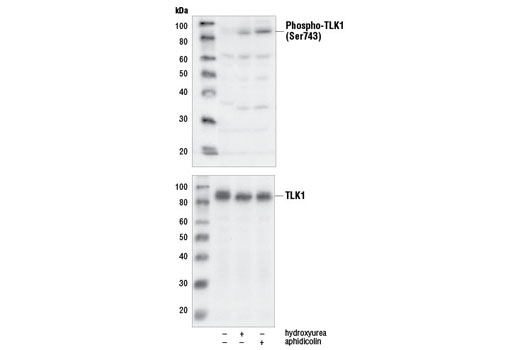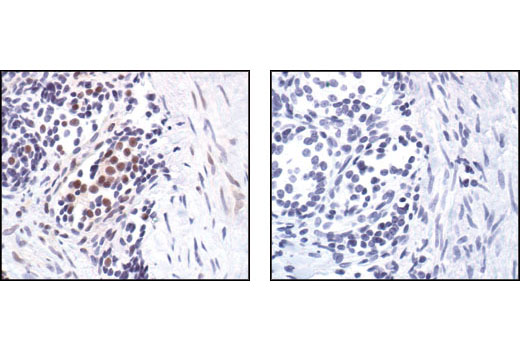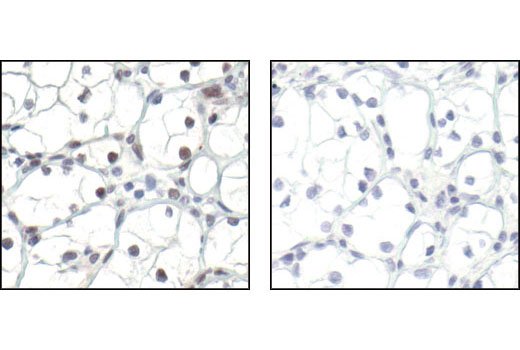WB, IP, IHC-P
H M R
Endogenous
86
Rabbit
#Q9UKI8-2
9874
Product Information
Product Usage Information
| Application | Dilution |
|---|---|
| Western Blotting | 1:1000 |
| Immunoprecipitation | 1:100 |
| Immunohistochemistry (Paraffin) | 1:300 |
Storage
Specificity / Sensitivity
Species Reactivity:
Human, Mouse, Rat
Source / Purification
Polyclonal antibodies are produced by immunizing animals with a synthetic phosphopeptide corresponding to residues surrounding Ser743 of human TLK1. Antibodies are purified by protein A and peptide affinity chromatography.
Background
Tousled-like kinases (TLK1 and TLK2) are nuclear serine/threonine kinases named for their homology to the Tousled gene from Arabidopsis thaliana, essential for flower development (1). The kinase activities of the TLKs are cell cycle regulated, with maximal activity during S phase (1). TLK appears to play a role in chromatin assembly and DNA damage checkpoint regulation (1,2). In C. elegans, TLK1 is essential for appropriate transcription during embryonic development (3). Substrates for TLK include the human chromatin assembly factor Asf, which functions in DNA replication- and repair-coupled chromatin assembly (2). DNA damage during S phase, when TLK is maximally active, leads to inhibition of TLK activity (1). This inhibition requires ataxia mutated kinase (ATM) and Chk1 (4,5). ATM and the related kinase ATR are activited by DNA damage during S phase, phosphorylate Chk1/Chk2, and block the transition into mitosis (6). Chk1 phosphorylates TLK1 on Ser743 in vitro and in vivo, leading to inhibition of TLK1 activity (4). This process likely provides a mechanism to slow the chromatin assembly processes controlled by TLK in the event of DNA damage.
- Silljé, H.H. et al. (1999) EMBO J 18, 5691-702.
- Silljé, H.H. and Nigg, E.A. (2001) Curr Biol 11, 1068-73.
- Han, Z. et al. (2003) Curr Biol 13, 1921-9.
- Groth, A. et al. (2003) EMBO J 22, 1676-87.
- Krause, D.R. et al. (2003) Oncogene 22, 5927-37.
- Kastan, M.B. and Lim, D.S. (2000) Nat Rev Mol Cell Biol 1, 179-86.
Species Reactivity
Species reactivity is determined by testing in at least one approved application (e.g., western blot).
Western Blot Buffer
IMPORTANT: For western blots, incubate membrane with diluted primary antibody in 5% w/v BSA, 1X TBS, 0.1% Tween® 20 at 4°C with gentle shaking, overnight.
Applications Key
WB: Western Blotting IP: Immunoprecipitation IHC-P: Immunohistochemistry (Paraffin)
Cross-Reactivity Key
H: human M: mouse R: rat Hm: hamster Mk: monkey Vir: virus Mi: mink C: chicken Dm: D. melanogaster X: Xenopus Z: zebrafish B: bovine Dg: dog Pg: pig Sc: S. cerevisiae Ce: C. elegans Hr: horse GP: Guinea Pig Rab: rabbit All: all species expected
Trademarks and Patents
Limited Uses
Except as otherwise expressly agreed in a writing signed by a legally authorized representative of CST, the following terms apply to Products provided by CST, its affiliates or its distributors. Any Customer's terms and conditions that are in addition to, or different from, those contained herein, unless separately accepted in writing by a legally authorized representative of CST, are rejected and are of no force or effect.
Products are labeled with For Research Use Only or a similar labeling statement and have not been approved, cleared, or licensed by the FDA or other regulatory foreign or domestic entity, for any purpose. Customer shall not use any Product for any diagnostic or therapeutic purpose, or otherwise in any manner that conflicts with its labeling statement. Products sold or licensed by CST are provided for Customer as the end-user and solely for research and development uses. Any use of Product for diagnostic, prophylactic or therapeutic purposes, or any purchase of Product for resale (alone or as a component) or other commercial purpose, requires a separate license from CST. Customer shall (a) not sell, license, loan, donate or otherwise transfer or make available any Product to any third party, whether alone or in combination with other materials, or use the Products to manufacture any commercial products, (b) not copy, modify, reverse engineer, decompile, disassemble or otherwise attempt to discover the underlying structure or technology of the Products, or use the Products for the purpose of developing any products or services that would compete with CST products or services, (c) not alter or remove from the Products any trademarks, trade names, logos, patent or copyright notices or markings, (d) use the Products solely in accordance with CST Product Terms of Sale and any applicable documentation, and (e) comply with any license, terms of service or similar agreement with respect to any third party products or services used by Customer in connection with the Products.



